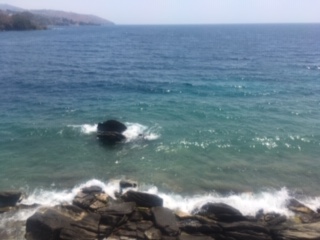
Lake Malawi beside me as I write.
I have been sleeping with fish. Every morning since we arrived, I’ve been for a swim at daybreak. I am blessed with buoyancy, and rarely need even to flutter a finger to stay afloat. Weightless, sleek and fluid in water, I am aquatic. At dawn, the water is still; it barely responds to the early breezes of the day. Sunlight slants through the water. I swim toward it. The fish are at rest and I rest with them. If I arrive quietly with the light in front of me, we float, at ease, together.
Day after day, my most sublime moments are floating beside and among the bewildering and beautiful community of cichlids. I lose track of time and place as I float, softened by the undulations of the water, drifting with fish.
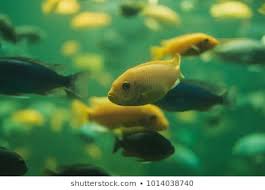
Again, sorry, no gopro – so the fish images are google catches
I’ve said before, but must repeat, these fish are dazzlingly beautiful. Each individual is perfect. Dorsal fins are sharp, iridescent scales sparkle blue, white, and yellow, with silver glancing off them at all angles. They are streamlined, graceful, with billowy ta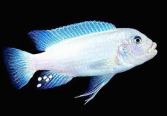 ils and fins. The tiny white ones have black and yellow eyes lined in brilliant turquoise like flamboyant “cover girls” from the 70’s. The blue ones, some striped boldly with black, others just quavering between periwinkle and mauve, are slight but magnetic to watch.
ils and fins. The tiny white ones have black and yellow eyes lined in brilliant turquoise like flamboyant “cover girls” from the 70’s. The blue ones, some striped boldly with black, others just quavering between periwinkle and mauve, are slight but magnetic to watch.  The velvety black ones move like shadows, but their flouncy fins remind me of dresses in organdy.
The velvety black ones move like shadows, but their flouncy fins remind me of dresses in organdy.
Their mating and family lives are intricate. There are a number of cichlids who are mouth breeders. They hold their eggs in their mouths and later protect their babies from predators by apparently swallowing them. But it’s not a swallow, it’s a safe playpen, behind mum’s closed mouth. She sucks them in when trouble is near and spits them out when the coast is clear.
The males too get up to tricks. I had been fascinated by the number of fish I had seen with tiny brilliant yellow or orange spots under their tales. These are males, with anal fin egg spots, which look like tiny dabs of orange caviar. They are just tiny spots – and here the jury is out – that may or may not help them to attract a mate.
I happened upon a huge school in a cloud easily 2 metres across. Each of the tiny fish was about 2 cm long. They massed like darts of silver in the slanting dawn sunlight. Two formidable nanny fish guarded the cloud, chasing away unwanted intruders. They looked stalwart, thick, experienced and unflappable. They steered their cloud away from me, and I moved on.
Further down the ridge of rocks, I saw the huge mating craters the cichlids dig for themselves. These clever little fish create arenas for the fashion show they call mating. They are shallow, perfectly round and easy to spot in the sandy patches on the bottom. I can easily imagine these piscatory gladiators flashing their bright eyes and brandishing showy tails to woo their mates.
I wondered about their predators. In the afternoon, I watched, mesmerized, as a catfish, flat and sleek, black as ink, pursued them. The cichlids have the advantage here. They are small, quick, nimble. The catfish has a blunt head, easily as wide as most cichlids are long, and he is often outmaneuvered in the complex jagged avenues of rock. He’s fast though and well named as he seems to pounce, kitten-like. I was genuinely torn as I watched his relentless pursuit, not knowing which species to root for. When he finally took a small fish, I felt as though it had been a fair fight.
I realized I strayed a bit far from shore and was heading back to the ledge that marks the bay. Abruptly, a net lay stretched, low in the water, a metre below me and 15 metres long. The only marking was an empty pop bottle.
I reflexively recoiled. My ancient brain was hard wired and my first, instinctive response was to avoid being trapped. Curiosity, mixed with horrified revulsion then took over. This fight was not in any way fair.
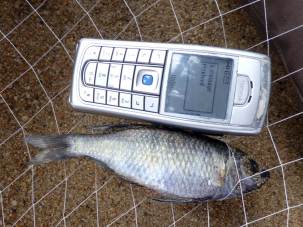
Photo: Ripple Africa
I watched a crab, hopelessly tangled in the bottom of the net furiously pinch at the water. The holes in the sharp nylon netting were under an inch across, just enough for the tiniest cichlids to pass. Far too small for most of the fish and certain to injure those lucky few who could get through. A beautiful blue, black fish was caught. The net was tightening just behind her head as she drove her tired body harder forward. Without a thought, I reached down and took her strong little body in my left hand.
I had been in fishing boats as a child, and Poppa had taught me how to hold a fish. Still, she was strong and wiggled galvanically at my touch and I let go. I realized that aborted attempts like that only made her situation worse. This was a Yoda moment – do or do not, there is no try. I gently took her in my hand again. With my right hand I tried to lift the nylon over the curved ridges of her dorsal fin. By now she was lying more quietly in my hand. Was she dying? Or did she know help was at hand? The nylon edged over and around her front fins and at last her head. I could see pale discoloration where the net had scraped her back raw. I wondered how it had affected her lidless eyes. At last, I released her, and within less than a second, she fled.
Other fish in the net were not so lucky. A gorgeous purple blue fish was badly tangled. I tried to reach him, but he spun. These fish are spinners, when they mate one of their shows is a spinning dance which I had watched with delight. This was anything but delightful. This distressed creature was furiously, madly spinning. He tied himself in knots until he lay, exhausted, dying. I could only swim away. I studied the net. There were not too many catches yet, but it was clearly just a matter of time.
I contemplated the knots holding the floats, but they were tight and hard against my pruny fingers. If only I were a Bond woman with a knife in my bikini. Instead, I could only look on bereft and helpless. This is one of how many nets laid to catch how many fish too small to have reached breeding age and much too small to eat? I have seen the strings of lights off shore at night. Fishing is a way of life here.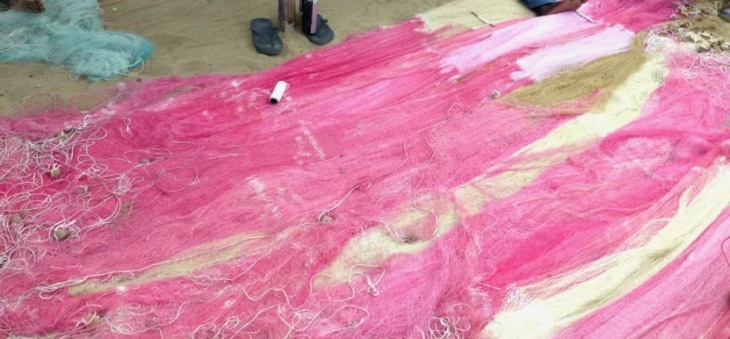
For many Malawians fish is their main source of protein. Efforts are being made to restrict the use of small gauge nets, create off-season windows for breeding and regulate the fishery to enable the fish stocks to keep pace with the demand. The work of Ripple Africa is a good example. Progress will be slow.
As I climbed back up the rocks, and regained my cumbersome terrestrial form, I was overwhelmed. The day before I had helped a small group to clean the beach near the port.
The plastics problem was well represented here. Much like freeing one fish, our beach cleaning efforts were a drop in the bucket. I came home to watch Greta Thunberg take on climate change, the biggest threat of all. She knows and tells us; we are the problem. We are the predators. Direct experiences like mine may help us grow our empathy and awareness, but here too, progress is too slow.
I had nearly gagged that night when served a butterfish – a local fish, quite big – considered a delicacy. Before it was placed in front of me, I knew my fish eating days are over. I have watched the suffering close by. I have held it with both my hands. I am forced to a sorry conclusion. My enjoyment of eating fish is not proportional in any way to the harm it is doing. It makes me feel sick.
You can’t sleep with somebody and then eat them for dinner.


